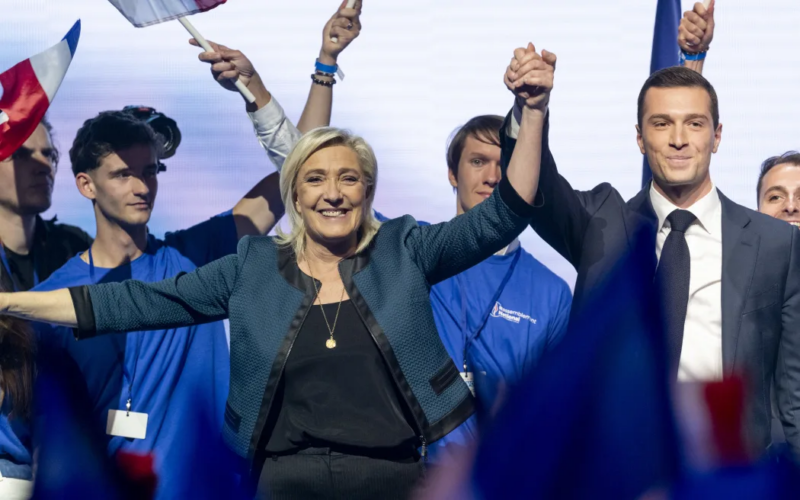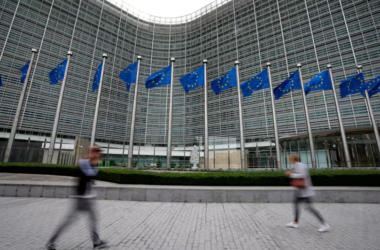Marine Le Pen’s National Rally (RN) leads in the first round of France’s parliamentary elections, setting the stage for possible far-right governance and dealing a significant blow to President Emmanuel Macron’s centrist coalition.
In a stunning political shift, Marine Le Pen’s far-right National Rally (RN) has emerged as the frontrunner in the first round of France’s parliamentary elections, according to results released by the Interior Ministry on Monday. The RN secured 33.15% of the vote, a significant increase from its previous parliamentary representation, and now poses a formidable challenge to President Emmanuel Macron’s Ensemble alliance.
High Turnout and Results
The election witnessed an unusually high turnout, reflecting the electorate’s strong engagement in this crucial vote. The left-wing New Popular Front (NFP) came in second with 27.99%, while Macron’s Ensemble slumped to third place with 20.76%.
Despite leading in the first round, the RN may fall short of the 289 seats required for an outright majority in the 577-seat National Assembly. Projections suggest the RN will win between 230 and 280 seats in the second round, a dramatic rise from its current 88 seats. The NFP is projected to secure between 125 and 165 seats, with Ensemble trailing at 70 to 100 seats.
Political Implications and Reactions
This outcome places France on the verge of a hung parliament, raising the prospect of political uncertainty and complex coalition negotiations. If the RN fails to achieve a majority, it could compel Macron to appoint a prime minister from an opposition party, leading to a rare “cohabitation” arrangement where the president and the parliamentary majority belong to different political factions.
Le Pen addressed jubilant supporters in Henin-Beaumont, celebrating the RN’s first-place finish but underscoring the importance of the upcoming second round on July 7. “Democracy has spoken, and the French people have placed the National Rally and its allies in first place – and has practically erased the Macronist bloc,” she stated.
RN’s leader, Jordan Bardella, echoed Le Pen’s sentiments at the party’s headquarters in Paris, stressing the historical significance of the forthcoming vote. Bardella has indicated a refusal to govern as a minority, which may force Macron to seek alliances with other parties or form a technocratic government.
Protest and Cordon Sanitaire
The prospect of a far-right government has sparked protests in Paris and Lyon. Demonstrations in Paris saw 5,500 people gather at Place de la Republique, with fireworks set off as part of the protests. In Lyon, 200 police were deployed to manage the unrest.
The RN’s strong showing has revived discussions of a “cordon sanitaire,” a strategy where centrist and left-wing parties unite to prevent far-right candidates from gaining office. This strategy has historical precedent in France, notably in the 2002 presidential election when parties rallied against the National Front’s Jean-Marie Le Pen.
Jean-Luc Melenchon, leader of France Unbowed and a prominent figure in the NFP, urged voters to prevent the RN from winning additional seats. “Not one more vote, not one more seat for the National Rally,” he declared. Green Party leader Marine Tondelier also called on Macron’s supporters to back candidates who align with republican values in constituencies where Ensemble is unlikely to succeed.
Macron’s Gamble and Future Challenges
Macron’s decision to call a snap election, France’s first since 1997, following his coalition’s defeat in the European Parliament elections, was a high-stakes gamble that now appears to have backfired. The outcome leaves him facing the remainder of his presidential term with potentially diminished power and increased political instability.
The RN’s potential rise to power has also unsettled financial markets, given its extensive spending pledges at a time when France’s budget may require austerity measures to comply with European fiscal rules. Market concerns have drawn parallels to the economic instability experienced during Liz Truss’s brief tenure as the UK’s prime minister.
In a statement on Sunday evening, Macron emphasized the importance of voter turnout and called for unity to oppose the RN in the second round. “Faced with the National Rally, the time has come for a broad, clearly democratic and Republican rally for the second round,” he said.
As France approaches the decisive second round of voting, the political landscape remains fluid, with the potential for significant shifts depending on the outcome. The final results will not only determine the composition of the National Assembly but also set the course for France’s governance in the coming years.








